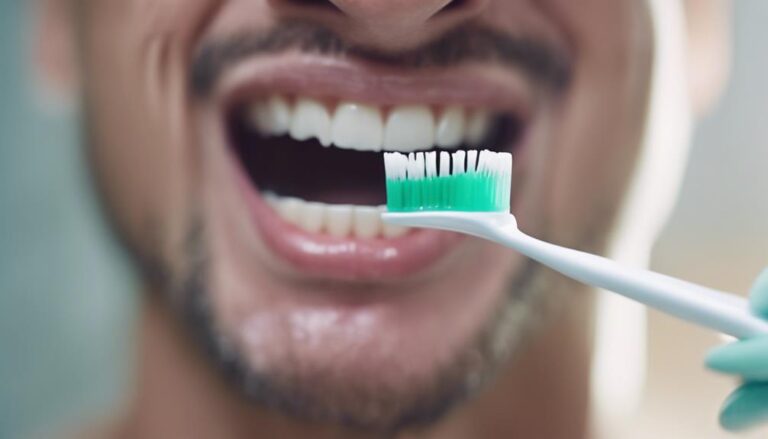In my experience, toothpastes with active ingredients like fluoride, triclosan, and essential oils work best for preventing gum disease. Fluoride strengthens enamel, while triclosan fights harmful bacteria. Essential oils like tea tree oil provide added antimicrobial benefits. Antimicrobial toothpastes reduce plaque and gingivitis, supporting gum health. Herbal options like aloe vera and peppermint oil also aid in gum disease prevention. Opting for ADA-approved toothpastes guarantees effectiveness. Remember, prioritizing ingredients like these can go a long way in keeping your gums healthy.
Key Takeaways
- Look for toothpaste with fluoride to strengthen enamel and prevent gum disease.
- Choose toothpaste with antimicrobial agents like triclosan for fighting bacteria.
- Consider natural ingredients like tea tree oil for their anti-inflammatory benefits.
- Opt for ADA-approved toothpastes with proven efficacy against gum disease.
- Consult with dental professionals for personalized recommendations for gum health.
Importance of Gum Health
Maintaining healthy gums is essential for overall oral health and well-being. Gum health tips and preventive care strategies play an important role in preventing gum disease. Proper oral hygiene, including regular brushing and flossing, is fundamental in keeping gums healthy. Brushing at least twice a day with a fluoride toothpaste helps remove plaque and bacteria that can lead to gum inflammation. Flossing daily is equally important as it removes food particles and plaque from between the teeth and along the gumline where a toothbrush can’t reach.
In addition to daily oral care, regular dental check-ups are essential for maintaining gum health. Dentists can detect early signs of gum disease and provide professional cleanings to remove hardened plaque, known as tartar, that can’t be removed by regular brushing. Furthermore, a balanced diet low in sugary foods and high in fruits and vegetables can support gum health by providing essential nutrients for gum tissue strength and repair. Implementing these preventive care strategies can help ensure healthy gums and overall oral health.
Active Ingredients to Look for
To optimize gum health and prevent gum disease, it’s crucial to identify specific active ingredients in toothpaste formulations that are particularly beneficial.
When selecting a toothpaste for gum disease prevention, look for key active ingredients that have been shown to be effective in scientific studies. Ingredients such as triclosan, a powerful antibacterial agent, can help reduce the bacteria that lead to gum disease.
Another crucial aspect is coenzyme Q10, which has antioxidant properties that can support gum health. Fluoride is also essential, as it strengthens enamel and helps prevent tooth decay, a contributing factor to gum disease.
Additionally, toothpaste containing essential oils like tea tree oil or eucalyptus oil can provide antimicrobial benefits. These active ingredients work synergistically to combat gum disease and promote overall oral health, backed by scientific evidence supporting their effectiveness.
Fluoride for Gum Disease Prevention
Fluoride plays an important role in preventing gum disease by strengthening enamel and inhibiting tooth decay, which are key factors contributing to gum health. As a dental professional, I recommend fluoride toothpaste for its numerous benefits in maintaining healthy gums. Here are four reasons why fluoride is essential for gum disease prevention:
- Strengthens Enamel: Fluoride helps to remineralize enamel, making it more resistant to acid attacks that can lead to gum disease.
- Inhibits Tooth Decay: By reducing the formation of cavities, fluoride indirectly supports gum health as decay can contribute to gum inflammation.
- Promotes Saliva Production: Saliva plays an important role in neutralizing acids and washing away food particles, aiding in the prevention of gum disease.
- Reverses Early Signs of Decay: Fluoride can reverse early stages of tooth decay, preventing further progression that may impact gum health.
Incorporating fluoride toothpaste into your oral hygiene routine can greatly contribute to the prevention of gum disease and overall oral health.
Antimicrobial Toothpaste Benefits
Utilizing antimicrobial toothpaste can offer significant benefits in combating oral bacteria and promoting gum health. Antimicrobial agents present in these toothpaste formulations work to reduce the levels of harmful bacteria in the mouth, thereby aiding in the prevention of gum disease. By targeting and eliminating these bacteria, antimicrobial toothpaste contributes to maintaining a healthier oral environment.
Additionally, some antimicrobial toothpaste products contain probiotic elements that can further support gum health by promoting a balance of good bacteria in the mouth.
Research has shown that antimicrobial toothpaste, when used as part of a thorough oral hygiene routine, can be effective in reducing plaque buildup and gingivitis, which are common precursors to gum disease. Moreover, the benefits of antimicrobial toothpaste are similar to those of antimicrobial mouthwash, offering an additional layer of protection against oral pathogens.
Incorporating antimicrobial toothpaste into your daily dental care regimen can play an essential role in supporting gum health and overall oral hygiene.
Natural Ingredients to Consider
Consider incorporating natural ingredients into your oral care routine to enhance gum health and overall oral hygiene. Here are four herbal remedies that may aid in gum disease prevention:
- Tea Tree Oil: Known for its antimicrobial properties, tea tree oil can help reduce inflammation and fight bacteria in the mouth, potentially benefiting gum health.
- Aloe Vera: Aloe vera has soothing properties that can help alleviate gum irritation and promote healing. It also possesses antimicrobial effects that may be beneficial for oral health.
- Peppermint: Peppermint oil is commonly used in DIY toothpaste recipes due to its fresh taste and potential antibacterial properties, which may contribute to gum disease prevention.
- Clove Oil: Clove oil contains eugenol, a compound with analgesic and antibacterial properties. It has been traditionally used for its numbing effect on toothaches and its potential benefits for gum health.
Integrating these natural ingredients into your dental care regimen can complement traditional oral hygiene practices and support gum health in a holistic manner.
Sensitivity Relief Toothpaste Options
For individuals experiencing tooth sensitivity, exploring toothpaste options specifically formulated for sensitivity relief can provide effective relief and improve overall oral comfort. When it comes to sensitivity relief toothpaste options, there are innovative formulas and natural remedies that can help alleviate discomfort and promote better oral health.
Here is a comparison table showcasing some popular sensitivity relief toothpaste options:
| Brand | Key Features | Recommended by Dentists |
|---|---|---|
| Sensodyne | Contains potassium nitrate for nerve protection | Yes |
| Colgate Sensitive | Has a high fluoride content for enamel strength | Yes |
| Pronamel | Helps to reharden enamel and protect against acids | Yes |
These toothpaste options are designed to cater to individuals with sensitive teeth, providing targeted relief and protection. Whether you prefer innovative formulas or natural remedies, there are options available to address your specific needs and enhance your overall oral health.
Tartar Control for Healthy Gums
Exploring toothpaste options that provide tartar control is essential for maintaining healthy gums and preventing gum disease. Tartar buildup can lead to gum inflammation and disease if left unchecked. Here are four key points to keep in mind when selecting a toothpaste for tartar prevention and gum health maintenance:
- Active Ingredients: Look for toothpaste containing ingredients like fluoride, pyrophosphates, and zinc citrate, which are effective in preventing tartar formation and supporting gum health.
- Tartar Control Technology: Opt for toothpaste with advanced tartar control technology that helps break down tartar and prevent its accumulation on teeth, reducing the risk of gum problems.
- ADA Seal of Acceptance: Choose toothpaste approved by the American Dental Association (ADA) for its effectiveness in tartar prevention and gum care. The ADA Seal guarantees the product meets high standards of safety and efficacy.
- Regular Usage: Consistent use of tartar control toothpaste as part of your daily oral care routine is essential for long-term gum health maintenance and preventing gum disease. Remember to brush twice a day for best results.
ADA Approved Toothpastes
When selecting toothpaste for best gum health and tartar control, prioritize options endorsed by the American Dental Association (ADA) for their proven effectiveness. The ADA evaluates toothpaste based on scientific evidence to guarantee they meet specific criteria for safety and efficacy in promoting oral health. Toothpastes approved by the ADA are formulated to help prevent gum disease by reducing plaque and tartar buildup, which are major contributors to periodontal issues.
ADA-approved toothpastes undergo rigorous testing to validate their claims in gum disease prevention. These toothpastes often contain ingredients like fluoride to strengthen tooth enamel, reduce cavities, and protect against gum disease. Additionally, they may include antibacterial agents to combat harmful bacteria in the mouth, further aiding in gum health.
When selecting toothpaste for best gum health and tartar control, prioritizing an ADA-approved product can provide reassurance of its quality and effectiveness in promoting gum health. By prioritizing ADA-approved toothpastes in your toothpaste selection, you can take a proactive step towards maintaining excellent oral hygiene and preventing gum disease.
Whitening Toothpaste and Gum Health
Whitening toothpaste can enhance gum health by effectively removing surface stains and promoting a brighter smile. When it comes to selecting the right whitening toothpaste for gum health, there are several key factors worth taking into account:
- Gentle Formulation: Opt for whitening toothpaste that’s gentle on your gums to prevent irritation or damage to the delicate gum tissue.
- Fluoride Content: Look for whitening toothpaste that contains fluoride, as fluoride helps strengthen tooth enamel, reducing the risk of gum disease.
- Antibacterial Properties: Choose whitening toothpaste with antibacterial properties to help combat harmful bacteria that can lead to gum inflammation and disease.
- ADA Seal of Acceptance: Select whitening toothpaste that carries the ADA Seal of Acceptance, ensuring it meets the necessary criteria for safety and effectiveness in promoting gum health.
Best Toothpaste for Gingivitis
For combating gingivitis effectively, selecting a toothpaste with proven anti-inflammatory properties is essential. When it comes to addressing gingivitis, incorporating natural remedies into your oral care routine can be beneficial. Professional recommendations often emphasize the importance of using toothpaste that not only fights bacteria but also reduces inflammation in the gums. Here is a comparison table to highlight key features of toothpaste for gingivitis:
| Features | Description |
|---|---|
| Natural Ingredients | Toothpaste containing herbal extracts such as aloe vera or tea tree oil can help soothe inflamed gums. |
| Anti-Inflammatory Agents | Look for active ingredients like fluoride, stannous fluoride, or essential oils known for their anti-inflammatory properties. |
| Tartar Control | Tartar buildup can worsen gingivitis; choose a toothpaste that effectively helps prevent tartar formation. |
| Recommended by Dentists | Opt for toothpaste brands that are recommended by dental professionals for their effectiveness in combating gingivitis. |
Choosing a toothpaste tailored to combat gingivitis with natural remedies and professional recommendations can greatly improve gum health.
SLS-Free Toothpaste for Gums
To promote gum health, choosing an SLS-free toothpaste can be beneficial due to its gentle formulation that’s less likely to irritate sensitive gums. SLS, or sodium lauryl sulfate, is a common ingredient in many toothpaste formulas that can cause irritation in some individuals, especially those with sensitive gums. Here are some key points to take into account when opting for an SLS-free toothpaste:
- Gentler Cleansing: SLS-free toothpaste provides effective cleaning without the harshness that SLS may bring, making it a suitable option for individuals with gum sensitivity.
- Reduced Irritation: Natural alternatives in SLS-free toothpaste can help soothe and calm irritated gums, promoting overall gum health.
- Moisturizing Properties: Some SLS-free toothpaste options contain ingredients that offer moisture to the gums, aiding in their protection and comfort.
- Sensitivity Solutions: SLS-free toothpaste can be a preferred choice for those seeking solutions for gum sensitivity, as it tends to be milder and less likely to trigger adverse reactions.
Choosing the Right Toothpaste Brand
Considering the significance of maintaining gum health with an SLS-free toothpaste, the selection of the right toothpaste brand is essential for overall oral care. When choosing a toothpaste brand, it’s important to take into account factors such as flavor preferences, brand reputation, price comparison, and ingredient sourcing.
Flavor preferences play a significant role in ensuring regular use of toothpaste. Selecting a brand that offers flavors you enjoy can promote consistent brushing habits, contributing to better gum health. Additionally, brand reputation is crucial in determining the quality and effectiveness of the toothpaste. Opting for well-known and trusted brands can provide assurance of product reliability.
Price comparison is also important when selecting a toothpaste brand. While cost shouldn’t compromise quality, finding a brand that fits your budget can help maintain a consistent oral care routine. Furthermore, examining ingredient sourcing is essential to ensure the toothpaste contains beneficial components without harmful additives. Prioritizing natural and clinically proven ingredients can support gum health effectively.
Best Toothpaste for Periodontal Disease
Choosing a toothpaste specially designed to fight periodontal disease can greatly enhance gum health. When selecting a toothpaste for periodontal disease, consider the following:
- Antibacterial Properties: Look for toothpaste containing ingredients like triclosan or stannous fluoride, which can effectively target the bacteria that contribute to gum disease.
- Anti-Inflammatory Agents: Ingredients such as fluoride, essential oils, or herbal extracts like chamomile can help reduce inflammation in the gums, a key factor in periodontal disease.
- Tartar Control: Tartar buildup can exacerbate gum issues, so opt for a toothpaste that offers effective tartar control to prevent further damage to the gums.
- Recommended by Dental Professionals: Consult with your dentist or periodontist for recommendations on specific toothpaste brands that are proven to combat periodontal disease effectively.
Prescription Toothpaste for Gum Health
Prescription toothpaste formulated specifically for gum health offers targeted care to address underlying issues contributing to gum disease. These prescription options often contain active ingredients like stannous fluoride, which has been shown in clinical studies to help reduce plaque buildup, fight bacteria, and promote gum health.
Clinical studies have demonstrated the effectiveness of prescription toothpaste in managing gum disease. For instance, a study published in the Journal of Clinical Periodontology found that using prescription toothpaste with certain antimicrobial agents led to a significant reduction in gum inflammation and bleeding compared to over-the-counter alternatives.
When considering prescription toothpaste for gum health, it’s crucial to consult with a dental professional. They can assess your specific oral health needs and recommend the most suitable treatment option. By incorporating prescription toothpaste into your oral care routine, you can target gum disease at its roots and work towards achieving optimal gum health.
Herbal Toothpaste Benefits
Exploring the benefits of herbal toothpaste reveals a natural approach to oral care that may offer unique advantages for gum health. When considering herbal toothpaste benefits, a holistic approach to oral hygiene becomes apparent.
Here are four key advantages of using herbal toothpaste:
- Natural Remedies: Herbal toothpaste often contains ingredients like neem, clove, or tea tree oil, known for their antibacterial and anti-inflammatory properties, which can help combat gum disease naturally.
- Holistic Approach: Herbal toothpaste takes a holistic approach by not only focusing on cleaning teeth but also promoting overall oral health and well-being.
- Reduced Chemical Exposure: By using herbal toothpaste, individuals can reduce their exposure to potentially harmful chemicals commonly found in traditional toothpaste formulations.
- Gentle on Gums: Herbal toothpaste is generally milder and gentler on the gums compared to some traditional toothpaste varieties, making it a suitable option for those with sensitive gums.
Incorporating herbal toothpaste into your oral care routine can be a beneficial step towards maintaining healthy gums and overall oral health.
Frequently Asked Questions
Can Using a Specific Toothpaste Cure Gum Disease Completely?
Using a specific toothpaste alone cannot cure gum disease completely. Long-term effectiveness requires a holistic approach. Alternative treatments and professional advice are essential for managing and preventing gum disease effectively.
Are There Any Potential Side Effects of Using Antimicrobial Toothpaste?
Swishing mouthwash brings a fresh gleam to oral hygiene. Antimicrobial toothpaste may cause irritation for some, but maintaining dental health with fluoride is essential. Consult your dentist about any concerns or side effects.
How Long Should I Use a Sensitivity Relief Toothpaste for Noticeable Results?
To achieve noticeable results with sensitivity relief toothpaste, maintaining a consistent long-term usage is crucial. Over time, I’ve noticed enhanced effectiveness in addressing tooth sensitivity and promoting overall gum health. It is imperative to uphold this routine.
Can Whitening Toothpaste Have Adverse Effects on Gum Health?
Prioritizing a balance between whitening benefits and overall oral health considerations is crucial when using whitening toothpaste excessively, as it can lead to enamel erosion and potentially harm gum health due to the abrasive nature of whitening ingredients.
Are There Any Natural Ingredients That Can Worsen Gum Disease if Used in Toothpaste?
When exploring natural ingredients in toothpaste, it is crucial to evaluate their impact on gum health. Some herbal remedies may worsen gum disease, while organic products can improve safety. Understanding their effectiveness is paramount.
Conclusion
In summary, maintaining good gum health is essential for overall oral health. Choosing the right toothpaste with active ingredients like fluoride and antimicrobials can help prevent gum disease.
Just like a well-tended garden thrives with the right nutrients and care, our gums need the proper dental care to flourish.
So, remember to brush regularly with a toothpaste that supports gum health to keep your smile bright and healthy.






